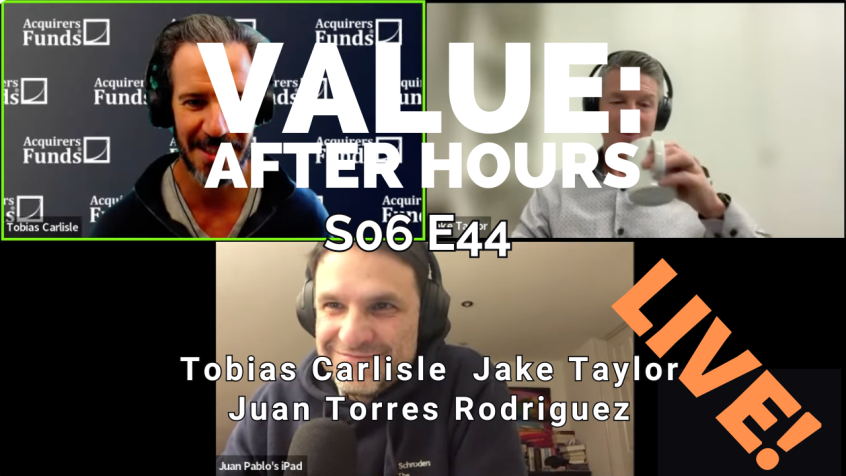During their recent episode, Taylor, Carlisle, and Juan Torres Rodriguez discussed Understanding Emerging Markets, Frontier Markets, and Investment Challenges. Here’s an excerpt from the episode:
Tobias: Can you just tell us the markets that you focus on, your universe and where you look mostly?
Juan: So, our investable universe is emerging markets as defined by MSCI. That’s pretty much 25 countries in total. And then, you could potentially extend that a little bit farther to include some frontier markets. If the value emerging markets is very spicy, frontier markets are a whole different level.
Jake: [chuckles] Yeah. Everything’s an emerging market now, unless it’s not the US. It’s how it feels. [chuckles]
Juan: Well, yeah, that’s actually pretty true. But the one thing that I would say is that sometimes you need to think on your feet, and you cannot allow yourself to be guided by what third-party people say or the way that people might classify something. So, I’ll give you two examples. Sometimes Macau is not considered to be part of emerging markets. So, the question is, if it’s not an emerging market, what is it? It’s not a Portuguese colony anymore. And if you were to ask people in Macau, what country rules you, I’m pretty sure that they will give you a very good answer about that.
And then, the other one that it’s a little bit more tricky is Hong Kong. So, Hong Kong used to be part of– well, it used to be a colony, but then it went back to the Chinese. It was supposed to be very independent. People still sees it as a developed market region, and it’s not part of MSCI or the EM investable universe. But if it’s not Chinese, what is it? Certainly, it’s not British and certainly it’s not developed and just follow the news. And so, Hong Kong is an EM place as well. So, I think that sometimes one needs to think on your feet and not allow yourself to be guided by others classifications.
Tobias: When you look at places like Hong Kong or Macau, technically they fall outside of your investable universe. Are you able to invest in them?
Juan: So, Macau, I think is a little bit more straightforward. I think that there is less push back. Hong Kong, we can invest in all of Chinese companies listed in the Hong Kong market. But if I go and buy a Hong Kong real estate company or a property developer based in Hong Kong or a telecom company based in Hong Kong, then I might potentially get pushback. But again, if that’s not part of China, what is it?
Tobias: Can you just tell us the markets that you focus on, your universe and where you look mostly?
Juan: So, our investable universe is emerging markets as defined by MSCI. That’s pretty much 25 countries in total. And then, you could potentially extend that a little bit farther to include some frontier markets. If the value emerging markets is very spicy, frontier markets are a whole different level.
Jake: [chuckles] Yeah. Everything’s an emerging market now, unless it’s not the US. It’s how it feels. [chuckles]
Juan: Well, yeah, that’s actually pretty true. But the one thing that I would say is that sometimes you need to think on your feet, and you cannot allow yourself to be guided by what third-party people say or the way that people might classify something. So, I’ll give you two examples. Sometimes Macau is not considered to be part of emerging markets. So, the question is, if it’s not an emerging market, what is it? It’s not a Portuguese colony anymore. And if you were to ask people in Macau, what country rules you, I’m pretty sure that they will give you a very good answer about that.
And then, the other one that it’s a little bit more tricky is Hong Kong. So, Hong Kong used to be part of– well, it used to be a colony, but then it went back to the Chinese. It was supposed to be very independent. People still sees it as a developed market region, and it’s not part of MSCI or the EM investable universe. But if it’s not Chinese, what is it? Certainly, it’s not British and certainly it’s not developed and just follow the news. And so, Hong Kong is an EM place as well. So, I think that sometimes one needs to think on your feet and not allow yourself to be guided by others classifications.
Tobias: When you look at places like Hong Kong or Macau, technically they fall outside of your investable universe. Are you able to invest in them?
Juan: So, Macau, I think is a little bit more straightforward. I think that there is less push back. Hong Kong, we can invest in all of Chinese companies listed in the Hong Kong market. But if I go and buy a Hong Kong real estate company or a property developer based in Hong Kong or a telecom company based in Hong Kong, then I might potentially get pushback. But again, if that’s not part of China, what is it?
You can find out more about the VALUE: After Hours Podcast here – VALUE: After Hours Podcast. You can also listen to the podcast on your favorite podcast platforms here:
For all the latest news and podcasts, join our free newsletter here.
Don’t forget to check out our FREE Large Cap 1000 – Stock Screener, here at The Acquirer’s Multiple:



